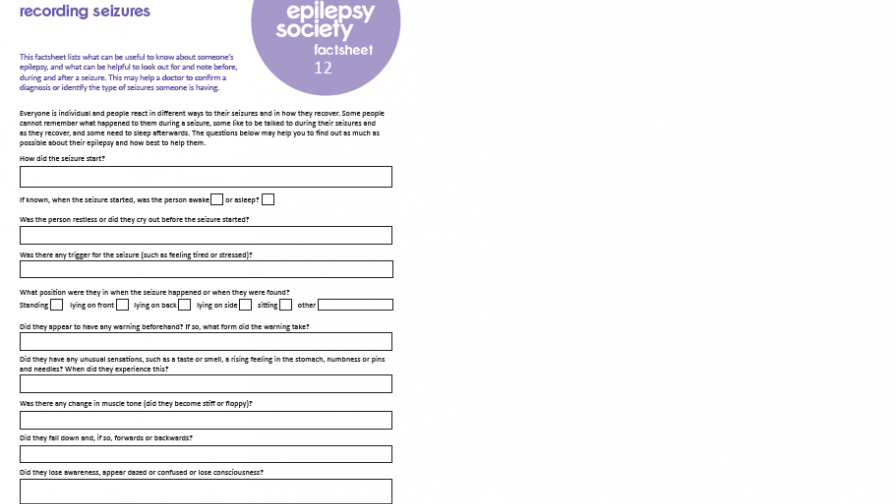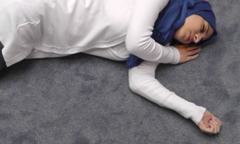What to record about a seizure
Everyone is individual and people react in different ways to their seizures and in how they recover. Some people cannot remember what happened to them during a seizure, some like to be talked to during their seizures and as they recover, and some need to sleep afterwards.
The questions below may help you to find out as much as possible about their epilepsy and how best to help them.
Before the seizure
- How did the seizure start?
- If known, when the seizure started, was the person awake or asleep?
- Was the person restless or did they cry out before the seizure started?
- Was there any trigger for the seizure (such as feeling tired or stressed)?
- What position were they in when the seizure happened or when they were found? For example, were they standing, lying on their front, lying on their back, lying on their side, or sitting?
- Did they appear to have any warning beforehand? If so, what form did the warning take?
- Did they have any unusual sensations, such as a taste or smell, a rising feeling in the stomach, numbness or pins and needles? When did they experience this?
During the seizure
- Was there any change in muscle tone (did they become stiff or floppy)?
- Did they fall down and, if so, forwards or backwards?
- Did they lose awareness, appear dazed or confused or lose consciousness?
- Was there any change in their breathing pattern? Did it become noisy or appear difficult or laboured?
- Was there any change in their facial colour? Did they become pale, blue around the mouth or flushed?
- Were their eyes open or closed during the seizure? If open, were the eyes turned to one side (which side)?
- Was there any movement, such as jerking or twitching? If so, was this rhythmical? Was it on both sides of the body or on one side only and, if so, which side? Was it symmetrical (exactly the same on both sides) or not symmetrical?
- Were there any automatisms (automatic behaviours) such as wandering around, making strange movements or postures, picking up objects for no reason or fiddling with clothing?
- Did they make any noises, such as mumbling, speaking incoherently or repeating words or phrases?
- How long did the seizure last?
- Were they incontinent (did they wet themselves)?
- Did they bite the inside of their cheek or their tongue?
After the seizure
- How were they afterwards? Were they confused or sleepy? If they slept afterwards, for how long?
- How long did it take them to fully recover from the seizure and return to normal activities?
Information produced: July 2018
First aid for epileptic seizures
A selection of first aid information for seizures including how to put someone into the recovery position and what to do if someone is in 'status'.
First aid for all seizures
How you can best help someone during a seizure depends on what type of seizure they have and how it affects them. On this page you'll find information on what the different types of seizures are and how to treat them.
The recovery position
Our step-by-step guide to the recovery position shows you how to help someone recover after a tonic clonic seizure. These steps should be followed once the shaking has stopped.




